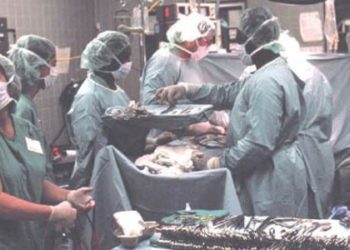Post-partum pelvic floor exercises may have limited value
1. Women randomized to receive pelvic floor muscle training had greater pelvic floor muscle strength than those in the control group.
2. However, no difference in stage of pelvic organ prolapse, bladder neck position or symptoms of pelvic organ prolapse was noted between the two groups.
Evidence Rating Level: 1 (Excellent)
Study Rundown: Pelvic organ prolapse (POP) is a common gynecological condition that affects many women. Women may experience vaginal pressure or bulging, stress urinary incontinence, and difficulty with urination and bowel movements, which can be distressing. Risk factors for POP include advancing age, obesity and parity. While the condition can be repaired surgically, many complications can be avoided through the use of other interventions. Previous work has shown that pelvic floor muscle training (PFMT) is associated with reduced symptoms and stage of POP. However, the majority of this work has focused on middle-aged women and limited attention has been paid to younger women who are also at risk – those in the postpartum period. The present work assesses whether the benefits of PFMT are observed in primiparous postpartum women. The authors found that while women receiving PFMT had slightly increased pelvic muscle strength, they did not have improved POP stage, bladder neck position or symptoms compared to controls.
Limitations of this study include small sample size, potential confounding and limited generalizability. While information on PFMT in the control group was collected, it is unknown whether there were differences in outcomes between women who did and did not do PFMT. Additional prospective cohort studies and/or randomized controlled trials with both primi- and multi- parous patients and analysis stratifying by age and adherence to PFMT may provide additional insight into the population most likely to benefit from postpartum PFMT.
Click to read the study in AJOG
Relevant Reading: Can pelvic floor muscle training reverse pelvic organ prolapse and reduce prolapse symptoms? An assessor-blinded, randomized, controlled trial
In-Depth [randomized controlled trial]: This randomized controlled trial evaluated the impact of PFMT on pelvic organ prolapse in primiparous women receiving group PFMT, performing home exercises (n=85) and those receiving no intervention (n=88). Outcomes assessed included stage of POP, bladder neck position, and bulge symptoms.
Women randomized to the PFMT group had greater pelvic floor muscle strength (p=0.02). POP stage, bladder neck position and symptoms were similar between intervention and control groups at six months of follow-up.
More from this author: Vitamin D not effective in reducing recurrent bacterial vaginosis, Cervical length may predict preterm delivery, Recurrent pregnancy loss associated with increased cardiovascular morbidity, Home self sonograms for assisted reproduction comparable to in-office imaging, Induction of labor more successful with standardization
Image: PD
©2012-2014 2minutemedicine.com. All rights reserved. No works may be reproduced without expressed written consent from 2minutemedicine.com. Disclaimer: We present factual information directly from peer reviewed medical journals. No post should be construed as medical advice and is not intended as such by the authors, editors, staff or by 2minutemedicine.com. PLEASE SEE A HEALTHCARE PROVIDER IN YOUR AREA IF YOU SEEK MEDICAL ADVICE OF ANY SORT.





